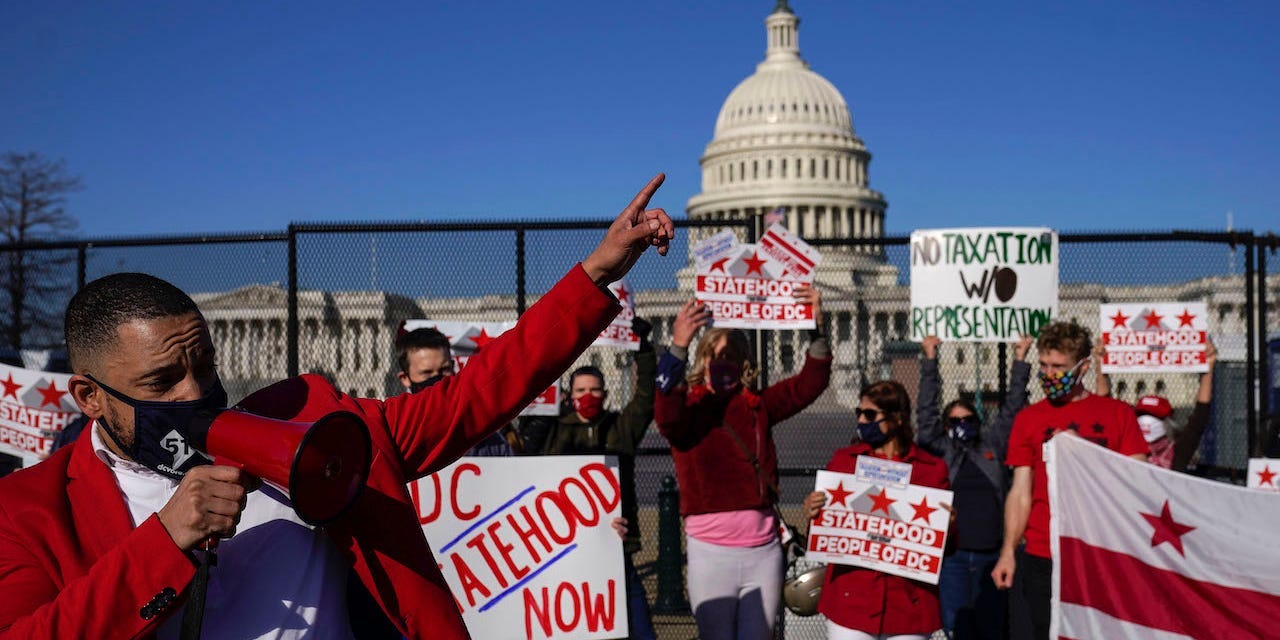
Drew Angerer/Getty Images
- The House passed a bill along party lines that would make Washington, DC the 51st state.
- HR 51 would give DC two voting senators, one voting member of the House, and a governor.
- The bill faces hurdles in the Senate, where it likely won't receive the 60 votes it needs to beat the filibuster.
- See more stories on Insider's business page.
The House of Representatives passed a bill along party lines on Thursday that would make Washington, DC the nation's 51st state.
The legislation, known as the Washington, DC Admissions Act or HR 51, would make the District a state known as the Douglass Commonwealth, named for the revered Black abolitionist Fredrick Douglass.
While a constitutional amendment passed in 1964 gave DC three Electoral College votes, the city's approximately 700,000 residents do not have any voting representation in Congress. HR 51 would give DC two senators, one congressperson, and a governor. Certain federal land and buildings, including the National Mall, the White House, and the Capitol, would be part of a separate, federally-controlled jurisdiction.
Stasha Rhodes, the director of the 51 for 51 Campaign, thanked Eleanor Holmes Norton, Washington, DC's delegate to the House of Representatives, for her "tireless efforts to help bring the statehood movement to this historic point."
But HR 51 faces serious hurdles in the Senate, where it needs at least 60 votes to overcome the filibuster. Progressive activists and many Democratic lawmakers are calling on the upper chamber to eliminate the filibuster, which would allow the bill to pass with a simple majority vote. The Senate is currently split 50-50 between Democrats and Republicans and Vice President Kamala Harris holds the tie-breaking vote.
Rhodes also echoed the need to eliminate the filibuster, saying, "We are calling on Leader Schumer and his colleagues in the Senate to not allow one vestige of slavery and Jim Crow to prevent us from rectifying another. We cannot allow D.C. statehood to become the next bill in a long line of civil rights legislation killed by the filibuster."
Republicans who oppose DC statehood argue that the bill is unconstitutional and a Democratic "power grab," pointing to the city's overwhelming majority of Democratic voters. Some GOP lawmakers agree with Democrats that DC residents should have representation in Congress, but say they should vote for Maryland's federal lawmakers rather than form their own state.
GOP lawmakers have also claimed that DC has too small of a population - although it has more residents than both Wyoming and Vermont - and is too corrupt and dependent on the federal government to be a state, among other arguments.
After the House Oversight and Reform Committee approved the measure last week, the White House formally backed the bill with a statement calling DC's lack of representation undemocratic.
"For far too long, the more than 700,000 people of Washington, D.C. have been deprived of full representation in the U.S. Congress," the White House said in a statement on Tuesday. "This taxation without representation and denial of self-governance is an affront to the democratic values on which our Nation was founded."
This is the second time in two years that the House has passed similar legislation. The previous Republican-controlled Senate declined to bring the legislation up for a vote in the last Congress.
A large majority of DC residents - 86%, according to a 2016 referendum - support statehood.